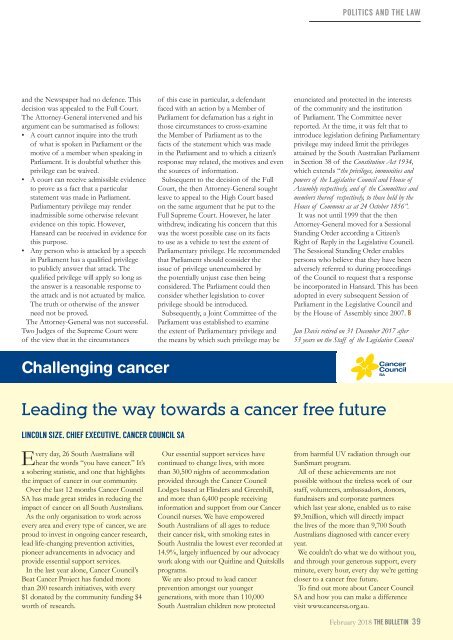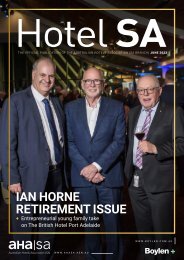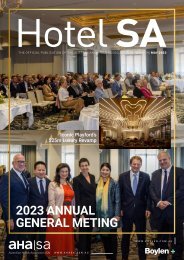LSB February 2018_Web_LSSA
Create successful ePaper yourself
Turn your PDF publications into a flip-book with our unique Google optimized e-Paper software.
POLITICS AND THE LAW<br />
and the Newspaper had no defence. This<br />
decision was appealed to the Full Court.<br />
The Attorney-General intervened and his<br />
argument can be summarised as follows:<br />
• A court cannot inquire into the truth<br />
of what is spoken in Parliament or the<br />
motive of a member when speaking in<br />
Parliament. It is doubtful whether this<br />
privilege can be waived.<br />
• A court can receive admissible evidence<br />
to prove as a fact that a particular<br />
statement was made in Parliament.<br />
Parliamentary privilege may render<br />
inadmissible some otherwise relevant<br />
evidence on this topic. However,<br />
Hansard can be received in evidence for<br />
this purpose.<br />
• Any person who is attacked by a speech<br />
in Parliament has a qualified privilege<br />
to publicly answer that attack. The<br />
qualified privilege will apply so long as<br />
the answer is a reasonable response to<br />
the attack and is not actuated by malice.<br />
The truth or otherwise of the answer<br />
need not be proved.<br />
The Attorney-General was not successful.<br />
Two Judges of the Supreme Court were<br />
of the view that in the circumstances<br />
of this case in particular, a defendant<br />
faced with an action by a Member of<br />
Parliament for defamation has a right in<br />
those circumstances to cross-examine<br />
the Member of Parliament as to the<br />
facts of the statement which was made<br />
in the Parliament and to which a citizen’s<br />
response may related, the motives and even<br />
the sources of information.<br />
Subsequent to the decision of the Full<br />
Court, the then Attorney-General sought<br />
leave to appeal to the High Court based<br />
on the same argument that he put to the<br />
Full Supreme Court. However, he later<br />
withdrew, indicating his concern that this<br />
was the worst possible case on its facts<br />
to use as a vehicle to test the extent of<br />
Parliamentary privilege. He recommended<br />
that Parliament should consider the<br />
issue of privilege unencumbered by<br />
the potentially unjust case then being<br />
considered. The Parliament could then<br />
consider whether legislation to cover<br />
privilege should be introduced.<br />
Subsequently, a Joint Committee of the<br />
Parliament was established to examine<br />
the extent of Parliamentary privilege and<br />
the means by which such privilege may be<br />
enunciated and protected in the interests<br />
of the community and the institution<br />
of Parliament. The Committee never<br />
reported. At the time, it was felt that to<br />
introduce legislation defining Parliamentary<br />
privilege may indeed limit the privileges<br />
attained by the South Australian Parliament<br />
in Section 38 of the Constitution Act 1934,<br />
which extends “the privileges, immunities and<br />
powers of the Legislative Council and House of<br />
Assembly respectively, and of the Committees and<br />
members thereof respectively, to those held by the<br />
House of Commons as at 24 October 1856”.<br />
It was not until 1999 that the then<br />
Attorney-General moved for a Sessional<br />
Standing Order according a Citizen’s<br />
Right of Reply in the Legislative Council.<br />
The Sessional Standing Order enables<br />
persons who believe that they have been<br />
adversely referred to during proceedings<br />
of the Council to request that a response<br />
be incorporated in Hansard. This has been<br />
adopted in every subsequent Session of<br />
Parliament in the Legislative Council and<br />
by the House of Assembly since 2007. B<br />
Jan Davis retired on 31 December 2017 after<br />
53 years on the Staff of the Legislative Council<br />
Challenging cancer<br />
Leading the way towards a cancer free future<br />
LINCOLN SIZE, CHIEF EXECUTIVE, CANCER COUNCIL SA<br />
Every day, 26 South Australians will Our essential support services have<br />
hear the words “you have cancer.” It’s continued to change lives, with more<br />
a sobering statistic, and one that highlights than 30,500 nights of accommodation<br />
the impact of cancer in our community. provided through the Cancer Council<br />
Over the last 12 months Cancer Council Lodges based at Flinders and Greenhill,<br />
SA has made great strides in reducing the and more than 6,400 people receiving<br />
impact of cancer on all South Australians. information and support from our Cancer<br />
As the only organisation to work across Council nurses. We have empowered<br />
every area and every type of cancer, we are South Australians of all ages to reduce<br />
proud to invest in ongoing cancer research, their cancer risk, with smoking rates in<br />
lead life-changing prevention activities, South Australia the lowest ever recorded at<br />
pioneer advancements in advocacy and 14.9%, largely influenced by our advocacy<br />
provide essential support services. work along with our Quitline and Quitskills<br />
In the last year alone, Cancer Council’s programs.<br />
Beat Cancer Project has funded more We are also proud to lead cancer<br />
than 200 research initiatives, with every prevention amongst our younger<br />
$1 donated by the community funding $4 generations, with more than 110,000<br />
worth of research.<br />
South Australian children now protected<br />
from harmful UV radiation through our<br />
SunSmart program.<br />
All of these achievements are not<br />
possible without the tireless work of our<br />
staff, volunteers, ambassadors, donors,<br />
fundraisers and corporate partners<br />
which last year alone, enabled us to raise<br />
$9.3million, which will directly impact<br />
the lives of the more than 9,700 South<br />
Australians diagnosed with cancer every<br />
year.<br />
We couldn’t do what we do without you,<br />
and through your generous support, every<br />
minute, every hour, every day we’re getting<br />
closer to a cancer free future.<br />
To find out more about Cancer Council<br />
SA and how you can make a difference<br />
visit www.cancersa.org.au.<br />
<strong>February</strong> <strong>2018</strong> THE BULLETIN 39


















